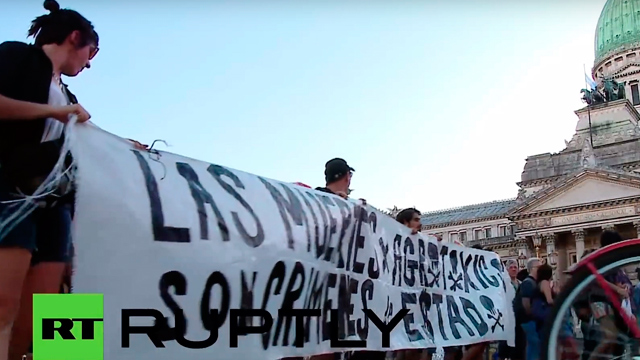Argentina's citizens block construction of Monsanto GMO plant, fight to protect sanctity of seeds and food against corporate imperialism
Wednesday, February 17, 2016 by: J. D. Heyes
Tags: Argentina, Monsanto, GMO plant

(NaturalNews) Agri-giant Monsanto continues to lose the public affairs battle with the people of the world who, by the hundreds of millions, are catching on to the dangers of genetically modified foods.
For more than three years now, protestors in Malvinas, Argentina have blocked the construction of what would become Monsanto's second-largest seed plant in Latin American after the local council approved construction of the plant.
"Cordobeses (residents of Cordoba) will be proud to have one of the most important (seed-producing) plants in the world," Monsanto's website claims, according to GMWatch. "The more than one thousand employees of Monsanto Argentina are proud and thankful to be a part of the community of Malvinas, Argentina."
However, after Monsanto broke ground for the plant in September 2013, "a group of activists blockaded the plant's five entrances and set up camp," the site noted.
Soon after, a court injunction halted construction officially in January 2015, but protesters have recently been handed an eviction notice, delivered at Monsanto's request, prompting local activists to mobilize further to strengthen the blockade. After that, a prosecutor suspended the eviction order.
Widening deforestation
GMWatch.org reported that on the two-year anniversary of the protest some 150 people passed through the camp to support those blockading the construction. Others went to the cities of Cordoba and Buenos Aires to march in solidarity with the message that Monsanto was not welcome in the country. And yet, despite mounting opposition and legal barriers, Monsanto continues to push to build the plant."Malvinas is a small town in the northeastern Argentinian province of Cordoba," GMWatch reported. "The area has long been the site of multinational corporate interests: Route A88, which runs past Monsanto's inactive site, serves plants owned by Coca-Cola, Argentine energy company YPF, and Bayer. Monsanto's proposed plant would be responsible for producing and treating corn seed."
Monsanto has been in Argentina for decades. In the mid-1950s, the company began making plastics, eventually manufacturing massively destructive chemical herbicides like Agent Orange, used to defoliate huge sections of Vietnamese jungle during the Vietnam War, and which led to major health problems for U.S. military personnel who fought there, as well as native populations.
In addition, Monsanto began producing GM soybeans in 1996, which quickly altered the nature of agriculture in Argentina, GMWatch reported. "Between 1980 and 2005, the area of land dedicated to soybean production increased from two million to 17 million hectares. Now, GM soy monocultures largely comprise the Argentinean countryside."
Many have blamed the proliferation of GM crops in the country for the deforestation of native forests and indirect deforestation that is caused by the relocation of cattle from better grasslands.
End of the family farm
"Not so long ago Argentina topped the world for meat production, but here there was not a cow in sight," said Glenn Ellis, a documentary filmmaker investigating Monsanto in Argentina.Once, Argentina boasted world-famous pasture-fed cattle, but the land grab for GM crops has moved them to feedlots, and their diets have changed from natural grass to processed grain.
Family farming, as in the U.S., is also a thing of the past in Argentina, and the GMO expansion of crops has not only driven cattle off the land but local farmers as well. GM crops are marketed as cost-saving, having higher yields and so forth, but they have been repeatedly shown to come with huge costs in terms of health and pesticide usage, without any appreciable yield increase.
"While deforestation and job loss are significant consequences of Argentina's GM boom, the rallying call for the grassroots opposition is health," reports GMWatch. "Despite the existence of laws prohibiting pesticide spraying close to residential areas (laws differ between regions and in some are nonexistent), GM soy is grown next to houses, water sources, workplaces, and schools."
Sources:
GMWatch.org
AlJazeera.com
TelesurTV.net
Argentina at FETCH.news
Get independent news alerts on natural cures, food lab tests, cannabis medicine, science, robotics, drones, privacy and more.
Take Action: Support Natural News by linking to this article from your website
Permalink to this article:
Embed article link: (copy HTML code below):
Reprinting this article:
Non-commercial use OK, cite NaturalNews.com with clickable link.
Follow Natural News on Facebook, Twitter, Google Plus, and Pinterest
- Newly released JFK files reveal Pentagon's role in creating Lyme disease and covid in the same lab
- BIGGEST SCAM: You pay income tax, then taxes on purchases, then personal property tax on what you own that you already paid taxes on with taxed money
- Analysis: The coming economic collapse, a mass uprising and Trump's three secret weapons to halt the growing revolt
- American food is the MOST TOXIC “FOOD” on earth
- EXPOSED: Antifa and IRS collude to shield radical funding from taxation
- The flu vaccine paradox: Are we making things worse?
- Big Pharma's $8 Billion bribery scheme exposed: how doctors are pushed to prescribe junk science, not heal
- A lack of integrity in Academia: Harvard professor found GUILTY of fraudulent research to promote CRT theory
- Heads up! List of food shortages expected in 2025 as the campaign of forced starvation continues to be waged against the American people
- Mike Adams Sermon 66: God will DESTROY ISRAEL for its wickedness
- Reclaim your health: How midlife exercise reverses years of inactivity
- Beyond consequence
- Florida takes a stand: DeSantis proposes permanent ban on mRNA vaccine mandates
- Discovery of Texas GOP representative living in retirement home amid health challenges and congressional absence sparks uproar
- Trump reverses course on Gaza plan, says “nobody is expelling Palestinians”
- 5 Simple steps to boost your brainpower: How to strengthen executive function in a distracted world
- OpenAI whistleblower who dissented against how the company trained ChatGPT found dead
- Government seizes millions of pounds of food amid global crisis
- Reclaim your health: How midlife exercise reverses years of inactivity
- A lack of integrity in Academia: Harvard professor found GUILTY of fraudulent research to promote CRT theory
- Space war brewing? Russia threatens to destroy Starlink satellites
- EPA advisor admits the agency is funneling billions to climate groups ahead of Trump’s return to White House
- Elon Musk: Aliens could be here on Earth RIGHT NOW
- Big Pharma's $8 Billion bribery scheme exposed: how doctors are pushed to prescribe junk science, not heal
- Historian warns Israel may be entering an “IRREMEDIABLE DECLINE”
- Trump reverses course on Gaza plan, says “nobody is expelling Palestinians”
- Mike Adams Sermon 66: God will DESTROY ISRAEL for its wickedness
- Rep. Nancy Mace introduces bill to ban biological males from female facilities on federal property
- New York politicians push bill allowing governor to indefinitely detain the unvaccinated on a whim
- RFK Jr.'s SSRI antidepressant investigation sparks liberal meltdown, exposes Big Pharma's dangerous game
- 5 Simple steps to boost your brainpower: How to strengthen executive function in a distracted world
- Mark Zuckerberg's REAL NAME is Jacob Greenberg and he is the GRANDSON of DAVID ROCKEFELLER, hence the POWER of FAKEBOOK
- Survival 101: Effective EMF blocking techniques
- Sales of survival bunkers rise following Russia’s use of the Oreshnik hypersonic ballistic missile
- Trump Administration cuts 2,000 USAID jobs, places most employees on leave in sweeping reform effort
- Pilots report mysterious lights 'moving at extreme speeds' across Oregon skies
- EPA advisor admits the agency is funneling billions to climate groups ahead of Trump’s return to White House
- The Health Ranger releases “Vaccine Zombie” song and music video, using AI-animated zombies for the music video
- The pandemic as a tool for INDOCTRINATION: Understanding “The Indoctrinated Brain” by Dr. Michael Nehls
- California's social media censorship law struck down: A victory for free speech or a threat to online safety?
- Mike Adams releases new song and music video: Nothing More Disgusting Than a Globalist
- Congratulations to the FULLY UNVACCINATED as you resisted the COVID-19 PROPAGANDA MACHINE fueled by over $100 BILLION
- Mike Adams releases country western hit single: Goin’ Back in Time is Comin’ Home
- Dr. Mike Yeadon releases 15-minute testimony - WATCH - about genocidal intent of COVID “vaccines”
- RFK Jr. clears key hurdle: Sen. Susan Collins backs controversial HHS nominee, signaling a new era for health policy
- Mike Adams releases music poetry sensation: A Child of God
- Unpacking the Lies That We’ve Been Fed – new song and music video released by Mike Adams, the Health Ranger
- Trump administration takes on global censorship: A new frontier for free speech advocacy
- Ex-FBI Chief EXPOSES disgraceful government coverups of Oklahoma City Bombing, Kennedy assassinations, 9/11 WTC, and "Terrorism" as plot to destroy Constitution
- Federal judge backs Trump's mass firings, clearing path for government downsizing
- Florida takes a stand: DeSantis proposes permanent ban on mRNA vaccine mandates
- Michigan sheriff announces criminal investigation into 2020 election crimes, Dominion Voting Systems
- “Why we influenced the 2020 elections”: Facebook files reveal the coordinated effort to bury the Hunter Biden laptop story
- Bush tomato: A mighty superfood that supports digestive health
- Red Cross issues warning to stop blood plasma donations from vaccinated people
- Scientists confirm: GENIUS brain function can be spontaneously unleashed in humans without any apparent cause
- EPA advisor admits the agency is funneling billions to climate groups ahead of Trump’s return to White House
- HYSSOP: What research reveals about the health benefits of this ancient holy herb
- Two containers with completed ballots fall out of truck in Florida
- Fully vaccinated about to see “tsunami” of illness and death, warns virologist
- Today I asked our AI language model “Neo” about which phytonutrients or phytochemicals can block the spike protein related to SARS-CoV-2 … Here is what it answered…
- Global leaders unite to clamp down on “misinformation” with UN-backed Cascais Declaration
- BREAKING: 2025 NDAA authorizes mandatory military draft of WOMEN across America… as Pentagon pursues global NUCLEAR war with both Russia and China at the same time
- Michael Yon warns of a ZIONIST TAKEOVER in Trump’s second administration
- BOMBSHELL: DNA testing kits are a SCAM to develop ethnic-specific bioweapons
- Ozempic and Wegovy weight loss drugs are injectable LIZARD VENOM PEPTIDES that may unleash a devastating wave of organ failure… side effects align with symptoms of SNAKE BITES
- Israeli soldiers accused of even more torture and abuse in the West Bank
- These 13 countries just signed an agreement to engineer a global FAMINE by destroying food supply
- NASA admits that climate change occurs because of changes in Earth’s solar orbit, and NOT because of SUVs and fossil fuels
- RFK Jr. clears key hurdle: Sen. Susan Collins backs controversial HHS nominee, signaling a new era for health policy
- Sermon 30: How Jesus reveals Caesar’s FAKE CURRENCY and FALSE AUTHORITY
- Coriander seeds: Ancient medicine backed by modern science
Science News & Studies
Medicine News and Information
Food News & Studies
Health News & Studies
Herbs News & Information
Pollution News & Studies
Cancer News & Studies
Climate News & Studies
Survival News & Information
Gear News & Information
News covering technology, stocks, hackers, and more



"Big Tech and mainstream media are constantly trying to silence the independent voices that dare to bring you the truth about toxic food ingredients, dangerous medications and the failed, fraudulent science of the profit-driven medical establishment.
Email is one of the best ways to make sure you stay informed, without the censorship of the tech giants (Google, Apple, Facebook, Twitter, YouTube, etc.). Stay informed and you'll even likely learn information that may help save your own life."
–The Health Ranger, Mike Adams












































